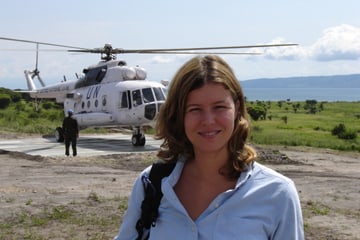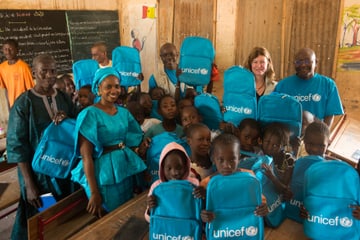"Sometimes you must compromise if you want a family – but I stress compromise, not sacrifice"
This is the third of three blogs exploring the challenges and opportunities associated with raising a family whilst working in international development. Here we focus on how Silvia Danailov has succeeded in juggling work and family in her career with UNICEF.

In the two previous blogs on this topic, we considered the perspective of a child of international parents, and the spouse of a professional woman who accompanied her and their children on two international assignments. Both gave a very positive account of their experiences. Silvia is in some ways more cautious, acknowledging that her career path and choices have not always been easy. Nevertheless, she represents an inspiring, confident and convincing role model.
Gaining field experience early on
Silvia chose to study international relations with the intention of pursuing an international career. Her first position was with the Federal Department of Foreign Affairs, but, hesitating between a diplomatic and development career, she chose the latter. She has now been working for UNICEF for over 20 years in a variety of countries – Somalia, Kenya, the Democratic Republic of Congo (DRC), Laos, Myanmar, Haiti, and now Senegal – in addition to two postings in New York. Working in countries with fragile governance as a relatively young woman, and facing humanitarian crises such as in Somalia, DRC and Haiti, was especially challenging - but, she says, gave invaluable practical experience. This served to anchor her credibility within UNICEF and to build her professional network.
Working in countries with fragile governance gave invaluable practical experience.

The challenge of finding a partner who has compatible goals
Finding a life partner is never easy. Finding one who is happy to share one’s chosen lifestyle of moving around the world to very different countries is especially difficult. There are no magic answers as to how to do this, and Silvia is open about having experienced a painful break-up with her first fiancé before she met her current husband. She suggests that the most important thing is for each person to be clear from the outset about what s/he wants in the relationship, including children. That way one can at least think through all the implications of an international family life, and whether that is what one wants.
Finding one who is happy to share your chosen lifestyle of moving around the world to very different countries is especially difficult.
And for those who cannot find a willing partner? Silvia points to a growing number of women working in international positions who have made the choice to have a child or children alone. There are of course advantages and disadvantages to so doing – but the existence of a supportive network between such women, alongside access to affordable and high-quality child and domestic care, makes it a feasible undertaking.
Being prepared to compromise
Any marriage counsellor – or expert negotiator – will advise that compromise is a necessary part of developing and maintaining a good relationship. Silvia notes, though, that too often one person – generally the woman in a heterosexual partnership – ends up compromising more than the other. Hence, she stresses the avoidance of sacrifice. In her case, delaying having children until her late 30s proved to be worrying as it took longer than expected for her to become pregnant. Both she and her husband then decided to be based in New York for several years to avoid family separation as a dual career couple. She felt her career progression was somewhat stalled as a result; she would have progressed much faster if she had been able to compete earlier for senior level positions outside America. Yet she has no regrets as she was able to offer a stable environment for her children in their early years and to devote herself more to objectives other than career progression alone.
Clarifying one’s objectives through professional coaching
This suggestion made by Silvia chimes with cinfo’s offer of services but was made quite spontaneously. “Throughout my career, coaching has been helpful to determine next steps and to think through priorities. It can really help to clarify one’s thoughts.” Anyone seeking such support can always contact one of the cinfo coaches!



